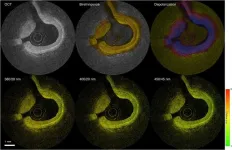PITTSBURGH, March 5, 2024 -- Results of the third and final cohort of the DELIVER (MTN-042) Phase IIIb study found no safety concerns with use of the monthly dapivirine vaginal ring beginning during the second trimester of pregnancy and up to the time of delivery, researchers reported today at the Conference on Retroviruses and Opportunistic Infections (CROI 2024) in Denver. With this latest data, the researchers believe there is now sufficient evidence that the dapivirine ring is safe to use to protect against HIV throughout pregnancy, when the risk of acquiring HIV is up to three times greater than at any other time.
DELIVER, which was conducted by the National Institutes of Health-funded Microbicide Trials Network (MTN) at four clinical research sites in Malawi, South Africa, Uganda and Zimbabwe, was designed ti evaluate the safey and acceptability of the monthly dapivirine vaginal ring, a relatively new HIV prevention method approved in several African countries and recommended by the World Health Organization (WHO), as well as collect additional safety data on the use of Truvada® (emtricitabine and tenofovir disoproxil fumarate) as daily oral pre-exposure prophylaxis (PrEP) during pregnancy. It was also designed to be conducted in a stepwise fashion, enrolling one group at a time, beginning with women late in pregnancy, when the potential risks from drug exposure are lowest, and only proceeding to the next group if an independent review of study data deemed it is safe to do so. In total, 558 participants were enrolled across all three cohorts, 409 of whom used the dapivirine ring.
At last year’s CROI meeting, MTN researchers presented the results from the first two cohorts of participants, who were in their third trimester of pregnancy and randomly assigned to use either the dapivirine ring or Truvada as daily oral PrEP until delivery. As with Cohorts 1 and 2, results for Cohort 3, which enrolled 251 participants who were between 3 and 6 months pregnant (12-29 weeks gestation), outcomes and complications were no different than would be expected of women in the local communities where DELIVER was conducted.
Prior to DELIVER, researchers knew only about the ring’s safety during conception and early pregnancy based on 86 participants who became pregnant while using the ring during the Phase III ASPIRE (MTN-020) study and stopped its use upon learning they were pregnant. There were no significant differences in pregnancy and infant outcomes between participants who were using the dapivirine ring when they got pregnant and those who were using a placebo ring.
“With DELIVER, we now have data on the ring’s safety during all stages of pregnancy,” said Felix G. Mhlanga, MBChB, MMed (Obs/Gyn), Senior Lecturer, University of Zimbabwe Clinical Trials Research Centre (UZ-CTRC), and a protocol chair of the DELIVER study. “We can now say with much greater confidence that the dapivirine ring is safe to use during pregnancy – safe for the mother and safe for her baby.”
In Cohort 3, four times as many participants were randomized to use the monthly dapivirine ring than Truvada as daily oral PrEP. Of the 251 participants, 202 were assigned to use the ring and 49 to use Truvada as daily oral PrEP. Because pregnancy outcomes were not available for three participants, results presented at CROI were for 248 participants – 200 who used the ring up until delivery and 48 who used Truvada.
With no placebo group in DELIVER, researchers needed a basis for comparison in order to evaluate the safety of the ring and daily oral PrEP during pregnancy, and so they conducted the MTN-042B sub-study, which consisted of a review of more than 10,000 medical records at the same hospitals and clinics where DELIVER study participants would give birth.
Dr. Mhlanga reported that the vast majority (94 percent) of pregnancies in Cohort 3 went to full term; only 4 percent were premature births (earlier than 37 weeks). There were two stillbirths in the dapivirine ring group, and neither was deemed related to use of the ring. The frequency of stillbirths in the dapivirine ring arm (1 percent) and the cohort as a whole (0.8 percent) were lower than what was observed in the MTN-042B sub-study.
Complications associated with high blood pressure, or so-called hypertensive disorders of pregnancy, which includes gestational hypertension, eclampsia and preeclampsia, were the most common complications experienced by study participants, but occurred at rates lower than or similar to local background rates of 10.5 percent based on the records review. Across both groups, hypertensive disorders of pregnancy were experienced by 10 percent of participants in Cohort 3; with 9 percent of dapivirine ring users having had a diagnosis encompassing a hypertensive disorder, compared to 14 percent among PrEP users.
One of the biggest theoretical concerns about the ring’s use during pregnancy was that as a foreign object it would cause an infection that would lead to preterm delivery—this was not observed.
No maternal or infant serious adverse events were deemed related to use of either study product. Eleven congenital anomalies were identified, with umbilical hernias accounting for seven of the eleven, and none being related to study product.
Researchers also reported that there were no maternal deaths and no participants acquired HIV during the study.
Analysis of data indicating regarding product use (product exposure) is still ongoing. Because babies are followed for one year after their birth, these results aren’t expected until late 2024 or early 2025.
In addition to Dr. Mhlanga, Katherine Bunge, M.P.H., M.D., associate professor of obstetrics, gynecology and reproductive sciences at the University of Pittsburgh School of Medicine, also serves as a protocol chair of the DELIVER study, and Lee Fairlie, MBChB, FCPaeds (SA), MMED (Paeds), associate professor, from Wits RHI in Johannesburg, South Africa, serves as protocol co-chair.
The clinical trial sites that have been conducting DELIVER are the College of Medicine-Johns Hopkins University Research Project in Blantyre, Malawi; Makerere University-Johns Hopkins University (MU-JHU) Research Collaboration in Kampala, Uganda; Wits RHI Shandukani Research Centre in Johannesburg, South Africa; and the UZ-CTRC in Zengeza, Zimbabwe.
The monthly dapivirine vaginal ring was developed by the non-profit International Partnership for Microbicides (IPM), In mid-2022, the dapivirine vaginal ring and other IPM assets were transferred to the Population Council, a global nonprofit research organization.
DELIVER and its companion study, the B-PROTECTED (MTN-043) study, were designed to provide the kind of information regulatory authorities and national programs would need to consider making the dapivirine ring available for use during pregnancy and breastfeeding and enable health care providers and pregnant and breastfeeding individuals themselves to make informed decisions.
# # #
The MTN and the DELIVER study were supported by U.S. National Institutes of Health grants UM1AI068633, UM1AI068615 and UM1AI106707. The content is solely the responsibility of the authors and does not necessarily represent the official views of the National Institutes of Health.
The study products for DELIVER were provided by the International Partnership for Microbicides (IPM) and Gilead Sciences.
More information about DELIVER can be found at https://www.mtnstopshiv.org/news/studies/mtn042
About the Microbicide Trials Network
The Microbicide Trials Network (MTN) works within a global community of research programs, investigators and partners committed to the development of a range of HIV prevention options that will meet the needs and preferences of people at different times of their lives. Based at Magee-Womens Research Institute and the University of Pittsburgh, the MTN was from 2006 until November 30, 2021, an HIV/AIDS clinical trials network funded by the National Institute of Allergy and Infectious Diseases with co-funding from the Eunice Kennedy Shriver National Institute of Child Health and Human Development and the National Institute of Mental Health, all components of the U.S. National Institutes of Health. MTN’s mission was to conduct rigorous clinical trials designed specifically to support the potential licensure of promising microbicides – products applied inside the vagina or rectum to prevent the sexual transmission of HIV. MTN studies have provided important insight into what is needed in a rectal microbicide product, contributed to the World Health Organization’s recommendation of the dapivirine vaginal ring as an additional HIV prevention option for women at risk of HIV and the ring’s approval in several countries and include among the first HIV prevention studies involving pregnant and breastfeeding women. More information about the MTN is available at www.mtnstopshiv.org.
END



